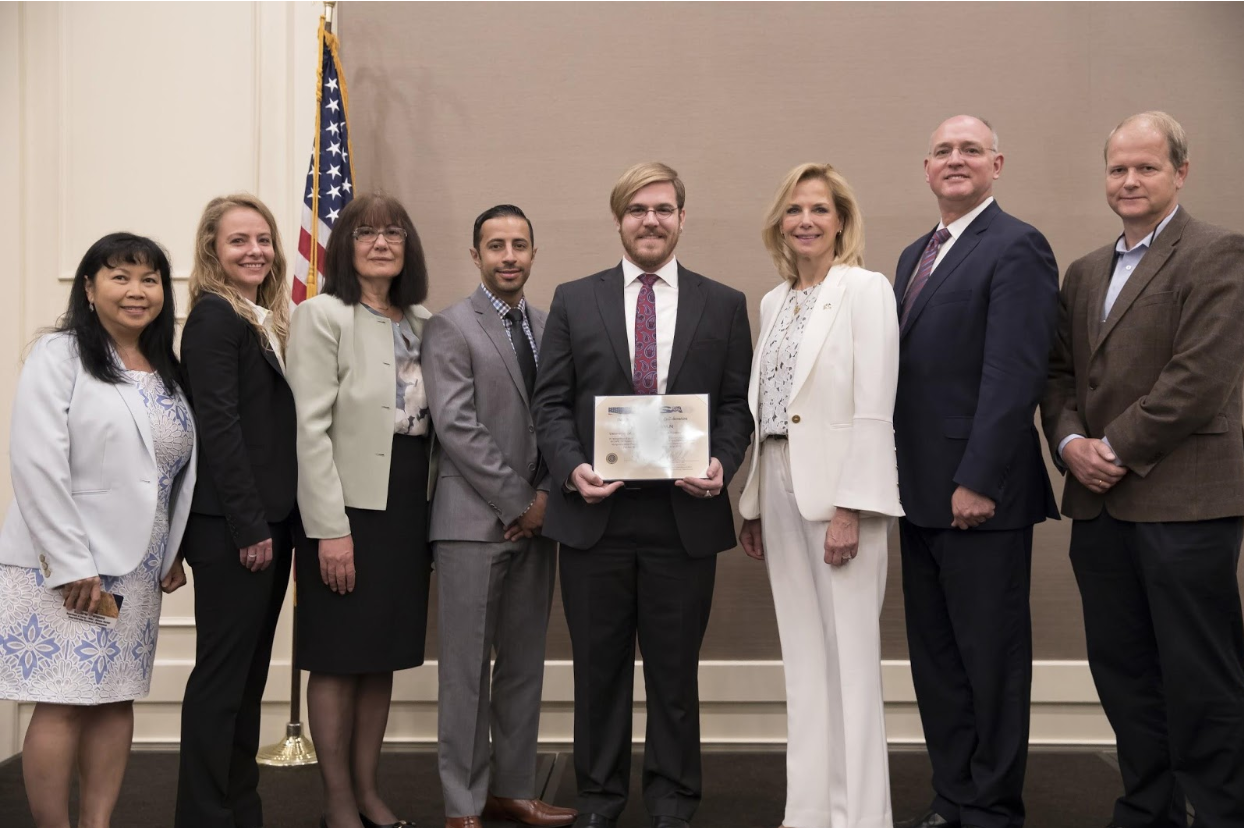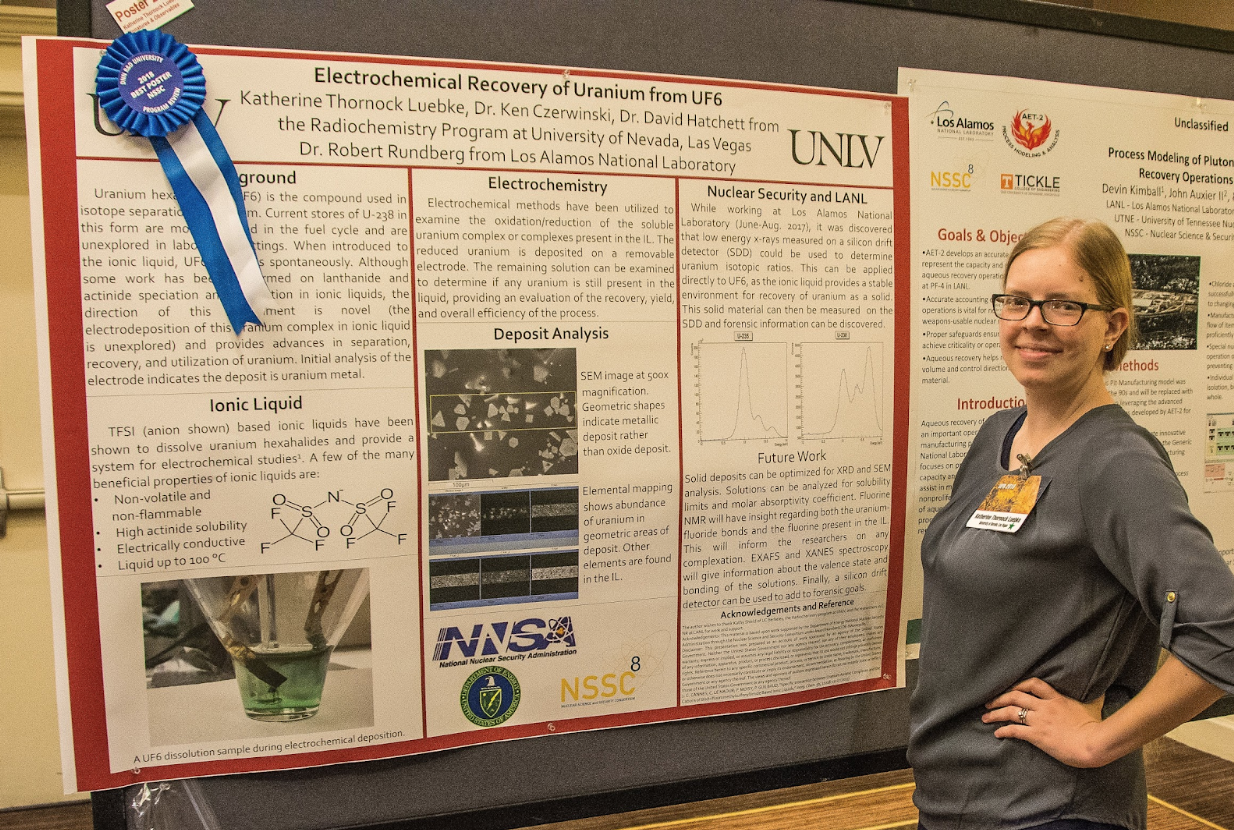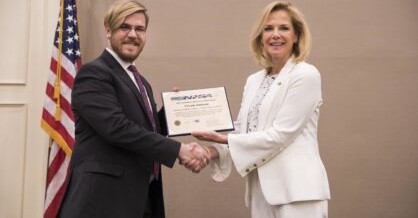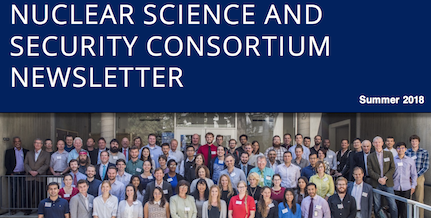Department of Energy Under Secretary for Nuclear Security/Administrator of the National Nuclear Security Administration attends program review featuring the Nuclear Science and Security Consortium
The Nuclear Science and Security Consortium (NSSC), a multi-institution initiative headquartered at UC Berkeley, participated in the annual Department of Energy (DOE) National Nuclear Security Administration (NNSA) Defense Nuclear Nonproliferation Research and Development (DNN R&D) University Program Review (UPR) meeting on June 5-7, 2018 in Ann Arbor, MI, hosted by University of Michigan. Ms. Lisa E. Gordon-Hagerty, DOE Under Secretary for Nuclear Security and NNSA Administrator, provided the opening address at the program review to an audience of more than 285 students, faculty, national laboratory scientists, and DOE NNSA program officials, including Dr. Edward Watkins, Assistant Deputy Administrator, DNN R&D and Dr. Victoria Franques, Senior Program Manager, DNN R&D.
The UPR focused on the work of the NSSC as well as the Consortium for Nonproliferation Enabling Capabilities (CNEC) and the Consortium for Verification Technology (CVT). These consortia, funded by DNN R&D as part of the Integrated University Program (IUP) with DOE Office of Nuclear Energy and the Nuclear Regulatory Commission, have a mission to develop the nation’s intellectual capital in nuclear science and engineering. The NSSC Student Fellows presented 18 oral presentations and 30 poster presentations. Three types of awards were presented to the students from the three consortia at the UPR meeting: awards for best national laboratory collaboration, best poster presentation, and best oral presentation.
Tyler Jordan, NSSC Graduate Fellow in the Department of Nuclear Engineering at the University of California, Berkeley, won an award for best national laboratory collaboration for his work at the Los Alamos National Laboratory (LANL) with mentors Dr. Madison Andrews and Dr. Krista Meierbachtol. Tyler’s research focuses on correlated fission experiments for fission model validation. This work increases the effectiveness of radiation detection systems that support efforts to stop the proliferation of nuclear weapons. Tyler Jordan said of his experience at UPR, “The effectiveness of the university consortium model becomes particularly evident during the UPR meeting, especially in terms of connecting students to national labs and government agencies. It’s not every day that I get to sit in a room full of experts in the field and at the institutions that I want to engage in my own career; the chance to discuss research with national lab staff scientists and other university researchers is immensely valuable to me.”
Katherine Thornock Luebke, NSSC Graduate Fellow in the Radiochemistry Program at the University of Nevada, Las Vegas, won an award for best poster presentation. Katherine’s poster detailed her work on electrochemical recovery of uranium from uranium hexafluoride, the compound used in the uranium enrichment process to produce fuel for nuclear weapons. Katherine had the opportunity to present her poster to NNSA Administrator Lisa E. Gordon-Hagerty at the UPR meeting and discuss her research supporting the nonproliferation mission. Katherine comments, “Being a part of the NSSC gives me the opportunity to share my research not just with other students in nuclear science fields, but with university faculty and national laboratory scientists from around the country.” Katherine’s work was performed in collaboration with her mentor Dr. Robert Rundberg from LANL and supports advances in the separation, recovery, and utilization of uranium.
Teal Pershing, NSSC Graduate Fellow at the University of California, Davis won an award for best oral presentation at the UPR meeting. Teal presented on his work with the WATCHMAN collaboration, which contributes to remote nuclear reactor monitoring using antineutrinos.
The DOE NNSA originally established the NSSC in 2011 through a $25 million award to the University of California, Berkeley-led consortium with Prof. Jasmina Vujic at the helm. In 2016, under Vujic’s leadership, the NSSC successfully recompeted for an additional five years of support at the same level. Since 2011, the NSSC has educated close to 400 students and postdoctoral scholars through a multidisciplinary program that provides hands-on training in nuclear science, technology, and policy. The NSSC enables a rich collaborative research environment between teams from 8 universities and 5 national laboratories, and fosters the development of science and technology underlying the nuclear security mission. The NSSC has transitioned almost 80 students to positions in the national laboratories or other government agencies. During NNSA Administrator Lisa E. Gordon-Hagerty’s opening speech at the UPR, she acknowledged the relevance of the IUP in contributing to the mission of the NNSA.
The other NSSC members include Michigan State University; the University of California, Davis; the University of California, Irvine; the University of Nevada, Las Vegas; George Washington University; Texas A&M University; and the University of Tennessee, Knoxville. These eight universities partner with five national laboratories: Los Alamos National Laboratory, Lawrence Berkeley National Laboratory, Lawrence Livermore National Laboratory, Oak Ridge National Laboratory, and Sandia National Laboratories.

Ms. Lisa Gordon-Hagerty presenting the award for Best National Laboratory Collaboration to NSSC Graduate Fellow, Tyler Jordan. Left to right: Dr. Victoria Franques, Dr. Bethany Goldblum, Prof. Jasmina Vujic, Dr. Rian Bahran, Mr. Tyler Jordan, Ms. Lisa Gordon-Hagerty, Dr. Ed Watkins, Prof. Kai Vetter.

Katherine Thornock Luebke, NSSC Graduate Fellow at the University of Nevada, Las Vegas, received an award for best poster presentation at the UPR meeting for her research on the electrochemical recovery of uranium from UF6.
JUN


